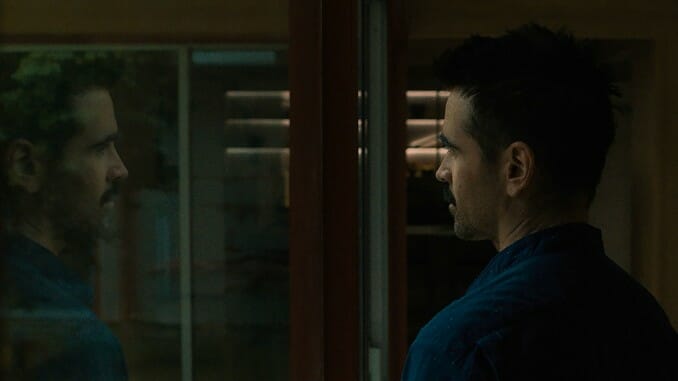After Yang Deftly Navigates Mechanical Melancholy

In After Yang, the sophomore narrative feature from video essayist-turned-filmmaker Kogonada, the near-future boasts a familiarity that is both comforting and disquieting. The idea that humanity continues to thrive despite the threat of imminent cataclysmic disaster certainly provides solace, but this seemingly idealistic alternative turns out to have its own distinct failings. In this timeline, childcare is virtually handed off to a class of “techno-sapien” laborers, purchased as programmable live-in nannies for children. Though it might meander at times, After Yang—based on Alexander Weinstein’s short story “Saying Goodbye to Yang”—is always emotionally intelligent and artfully prescient, showcasing Kogonada’s penchant for sparse storytelling even if the narrative throughlines don’t always feel as rewarding as the film’s aesthetic splendors.
We’re introduced to one such future family in perhaps the most entertaining way possible. The film’s title card appears during a virtual dance competition, featuring families from around the world competing via synchronized choreography. Jake (Colin Farrell) and his wife Kyra (Jodie Turner-Smith) wear matching unitards with their daughter Mika (Malea Emma Tjandrawidjaja) and her android brother Yang (Justin H. Minh), the family of four performing with nimble accuracy and an appropriate hint of playfulness. As such, it’s surprising when they’re eliminated for being out of sync—until they realize that Yang is robotically repeating the same dance move on a loop. Clearly having suffered a major malfunction, Jake resolves to find a way to fix Yang. Krya, however, sees this as an opportunity to let go of their robot nanny and finally step up for Mika as proper caretakers. Yet Mika can’t help but genuinely mourn the absence of her older brother, unable to understand how someone so integral to her life could simply cease to function merely as the result of planned obsolescence and “certified refurbished” scams. Jake and Mika effectively team up to search for a way to save Yang—the pursuit of which teaches Jake about Yang’s hidden interiority, and Mika about the precious (if fleeting) gift of love and connection.
After Yang manages to weave together tender truths concerning grief and the delicateness of human connection while also making astute, sober insights on the future of corporeal autonomy and consumer-based surveillance systems. Much of the film concerns the revelation that Yang actually stored “memories,” meaning he recorded several seconds each day that felt particularly noteworthy. This memory bank serves as an archive documenting Yang’s daily activities, revealing connections and observations that feel solidly human—raising questions as to why these “technos” are deemed so disposable outside of their ability to perform domestic tasks. This feels particularly heinous when examined through the simple fact that many of these “technos” are non-white, marketed as learning tools for adopted children to maintain a connection to the countries they were born in. This leads to the literal commodification of non-white bodies, manufactured and sold to do the labor of parenting, educating and loving “siblings” that are not their own. Though there’s never a doubt that Yang’s family cherishes and adores him—proven by the insistence of Jake and Mika to repair him—the mechanisms surrounding his existence are still clouded in an air of dubiousness. In this sense, the film evokes flashes of A.I. Artificial Intelligence, which is similarly concerned with the commodification of human connection and the oft-imposed limitations of individual autonomy.
-

-

-

-

-

-

-

-

-

-

-

-

-

-

-

-

-

-

-

-

-

-

-

-

-

-

-

-

-

-

-

-

-

-

-

-

-

-

-

-








































